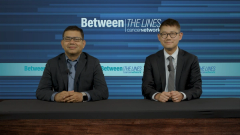
Expert Perspectives on Bispecific Monoclonal Antibody Administration in the Community Oncology Setting
Experts discuss real-world evidence demonstrating that bispecific antibodies such as teclistamab can be safely and effectively administered in community oncology settings using hybrid care models, with robust outcomes even in non–trial-eligible patients and manageable safety profiles that support broader access beyond academic centers.
Episodes in this series

These real-world data offer compelling evidence that bispecific antibodies, such as teclistamab, can be effectively and safely administered in community oncology settings. Despite a portion of patients not meeting the strict criteria of the MajesTEC-1 clinical trial, outcomes remained robust, highlighting strong response rates and encouraging 12-month progression-free survival. This supports the viability of integrating bispecifics beyond academic centers, especially when using hybrid care models where initial step-up dosing occurs at referral centers before transitioning patients back to local clinics.
The safety profile in this community-based cohort was especially noteworthy. Rates of cytokine release syndrome were low, predominantly grade 1, and all events resolved, indicating that early concerns around safety can be managed well with proper protocols. Infections, a major risk with T-cell–redirecting therapies, were observed but were largely manageable with consistent use of prophylactic strategies. Standardized approaches—such as Pneumocystis jirovecii pneumonia and varicella-zoster virus prophylaxis and increased use of intravenous immunoglobulin—appear to be helping reduce infection-related complications in these patients.
Although the study is promising, it is not without limitations. As a retrospective, real-world analysis, there is inherent variability in patient selection, supportive care, and data collection. Additionally, the practice patterns reflected here were largely shaped by the early adoption phase of bispecific therapy, when step-up dosing was still largely hospital based. As outpatient strategies become more common and prophylaxis protocols evolve, future real-world data may look different. Nonetheless, this analysis demonstrates that effective, durable, and safe treatment with teclistamab is not limited to trial-eligible patients or academic centers—a key step toward broadening access in multiple myeloma care.
Newsletter
Stay up to date on recent advances in the multidisciplinary approach to cancer.






































